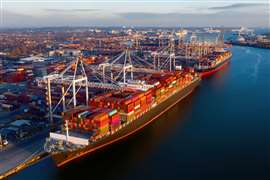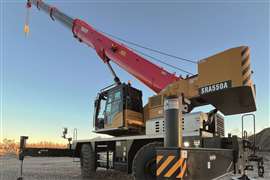Deutz looks to future
18 September 2012
.gif)
German engine manufacturer Deutz has gained long-term protection thanks to the increased investment by Volvo, its new majority shareholder, according to Robert Mann, the manufacturer's senior vice president of sales and service.
In June, Volvo increased its shareholding in Deutz from 6.7% to over 25%, spending €130 million buying shares from Same Deutz-Fahr Group (SDF). SDF is left with a share of 8.44% in Deutz.
Mr Mann said, "There is no need for Volvo to make a full acquisition since its current shareholding allows it to block any decisions it doesn't agree with at board level. From our position, the action really protects us in the long run. We have had a strategic partnership with Volvo since 1998, and we work well together.
We build Volvo engines between 4 litres and 8 litres with different electronic controls to the equivalent Deutz engine, so we both share technology and have differentiated technology. In addition, we compete in the larger engine category, so it's a partnership which works well, but leaves us open to compete on other levels."
Deutz - whose OEM construction equipment customers include Liebherr, Volvo, Atlas Copco, Hamm, Dynapac, Terex, JLG, Sennebogen, Ditch Witch, Voegele, Bomag and Wirtgen, among others - reported revenues of €681 million for the first six months of 2012.
While this result was down 6% year-on-year, the company claimed it was a solid performance in a challenging economic climate.
"While the US market is performing quite well, conditions in Europe are pretty terrible," Mr Mann said. "The southern European countries are effectively closed for business. In China, too, the market is low at the moment. Whatever stimulus funds that may be in the pipeline need to get moving through to projects. Having said that, our Chinese businesses are increasingly offering us more and more positive contact with Chinese OEMS."
In China, Deutz has established joint ventures with local producers including Shandong Changlin to produce a variety of engines for agricultural and industrial applications.
"There is a developing engine industry in China, and the world is a 75% Tier 3 world," Mr Mann said.
"But we are putting all our resources in developing technology for just 25% of the market."
Two-tier market
The reason for this is that manufacturers selling off-road diesel engines into Europe, Japan and North America must comply with stricter exhaust emissions legislation, and have been forced to invest heavily in research and development in order to come up with the technology to comply.
However, Mr Mann said the manufacturer had also given a lot of thought to how to "de-tier" its more advanced engines that comply with the current EU Stage IIIB/EPA Tier 4 Interim emissions laws. The idea is to enable such engines to be sold second hand into other countries where the exhaust emissions laws aren't as strict, and where the quality of diesel is much lower.
In its small-to-medium category, Deutz's EU Stage IIIB/EPA Tier 4 Interim engines range from the 2.9 litre TCD 2.9 to the 7.8 litre TCD 7.8. There are five models in total, ranging from 25kW to 250kW. The larger engine category contains two models - the 12 litre TCD 12.0 and the 16 litre TCD 16.0 - with outputs ranging from 300kW to 520kW.
The smallest engines in the EU Stage IIIB/EPA Tier 4 Interim range up to 90kW, feature minimal aftertreatment - just cooled exhaust gas recirculation (EGR) and a diesel oxidation catalyst (DOC).
After that, Deutz's DEVERT modular system gives OEMs the option of installing a range of different aftertreatment systems including selective catalytic reduction (SCR) and diesel particulate filters (DPFs) in order to comply with the emissions regulations in their region or sector.
Most engines above 90kW for construction applications use Deutz's EGR, DOC and DPF modules to comply with EU Stage IIIB/EPA Tier 4 Interim laws.
Mr Mann said Deutz's "de-tiering" strategy would allow these engines to run essentially as Tier 3 engines again.
"We have a strategy to allow the removal of the aftertreatment systems and to change the electronic programming of the engines to allow them to cope with a sulphur content of 2,000 to 3,000ppm. This would allow them to exit the regulated markets and be sold into other markets - but we think 2,000ppm is really the limit," he said.
Tier 4 Final
Deutz has also revealed its EU Stage IV/EPA Tier 4 Final engine design, to comply with the emissions legislation that is due to take effect from 2014. This engine will use both the EGR and DPF aftertreatment systems in combination with SCR technology to achieve the reductions in diesel exhaust pollutants required by the 2014 laws.
In addition, the manufacturer has invested in alternatives to diesel in an effort to get ahead of the curve and produce cleaner engines for the future. It has developed a 100% biodiesel engine that is currently in production for agricultural applications, and is also investigating hybrid drive systems.
It said the advantages of hybrid engines included the potential for OEMs to downsize to a diesel engine with a lower rated power output compared to a conventional engine installation, reduced fuel consumption and emissions as well as preventing the need for an exhaust aftertreatment system. The hybrid power reclamation technology could also provide high system dynamics through power boosting, according to the manufacturer.
But there is a long way to go before either bio-diesel or hybrid drives are really commercially viable for mass production.
"When the price of oil is high there is naturally more demand for biodiesel, but we are yet to see it really stretch further than agricultural applications. There are some mining applications which use it, but we're not sure about the demand in the wider market," Mr Mann said.
"We have several hybrid engines currently being tested in the field and we feel the hybrid model is probably more suitable for higher horsepower applications with short cycle times. But, like all cutting edge technologies, there are bottlenecks in the development process, and with hybrids it's current battery life developments."
Mr Mann pointed out that Volvo uses Deutz engines on its hybrid on-highway buses. "We are amassing the knowledge to take this technology forwards," he said.
Growth ahead
For full-year 2012, Deutz is forecasting revenues of between €1.3 billion and €1.4 billion, and further double digit growth in revenues for 2013. Looking ahead, it plans to grow its business in China and sees India as a strong potential growth market, too.






